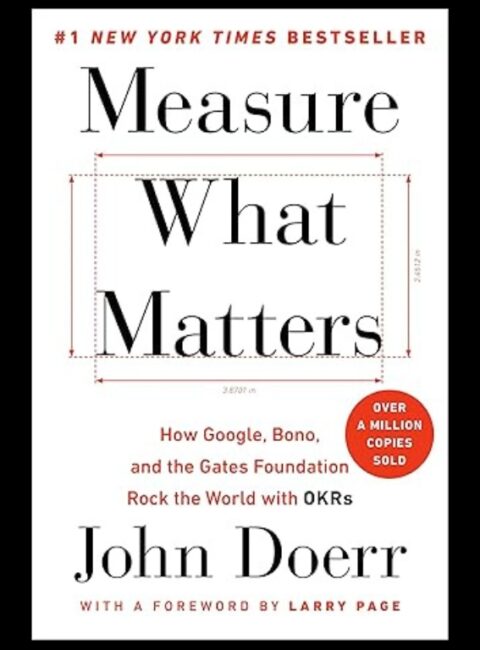Main Topic
The main topic of “Measure What Matters” is the concept of Objectives and Key Results (OKRs) and how they can revolutionize organizational goal setting and performance measurement.
Key Ideas or Arguments
- OKRs are a goal-setting framework that focuses on setting clear objectives and measurable key results to drive organizational success.
- The book emphasizes the significance of aligning OKRs throughout an organization, from top to bottom, to create a cohesive strategy.
- John Doerr, through various case studies, demonstrates how OKRs have been instrumental in the success of organizations like Google, Bono’s (U2) Product (RED) campaign, and the Gates Foundation.
- The importance of regular check-ins, feedback, and adaptability in the OKR process is stressed, fostering a culture of accountability and continuous improvement.
Chapter Titles or Main Sections
- Objectives and Key Results: Introduction to the OKR framework and its importance.
- Finding Your OKRs: How to identify and define effective objectives and key results.
- Setting the Strategy: Aligning OKRs with the organization’s mission and strategy.
- How Google Works: A case study on Google’s successful use of OKRs.
- A Powerful Mechanism: How OKRs enable progress tracking and improvement.
- Small Giants: Stories of smaller organizations benefiting from OKRs.
- The Garage Experiments: Innovation and OKRs.
- A Charitable OKR: Bono’s (RED) campaign as an example of OKRs in the non-profit sector.
- How They’re Doing Now: Updates on organizations previously discussed.
- The OKR Quartet: Reflection on the OKR framework’s impact and potential.
Key Takeaways
- OKRs are a versatile goal-setting tool applicable in both corporate and non-profit sectors.
- Alignment, regular check-ins, and adaptability are key to successfully implementing OKRs.
- Real-world case studies demonstrate the effectiveness of the OKR framework in achieving remarkable results.
Author’s Background and Qualifications
John Doerr is a venture capitalist with a successful track record and was an early advocate of the OKR framework. He has worked with organizations like Google and Amazon, making him well-qualified to discuss their application.
Comparison to Other Books
“Measure What Matters” stands out as a practical guide to OKRs, focusing on real-world examples. It complements more theoretical works on goal-setting and management.
Target Audience
This book is intended for business leaders, managers, and individuals interested in improving goal-setting and performance measurement within organizations. It is also relevant to those in the non-profit sector seeking effective strategies for achieving charitable objectives.
Reception or Critical Response
The book has been well-received, praised for its practical insights and the author’s ability to blend theory with real-world application.
Publisher and First Published Date
- Publisher: Portfolio
- First Published Date: April 24, 2018
Recommendations
- “Radical Focus” by Christina Wodtke
- “Lean Analytics” by Alistair Croll and Ben Yoskovitz
- “Measure What Matters: Online Tools for Understanding Customers, Social Media, Engagement, and Key Relationships” by Katie Delahaye Paine
To Sum Up
“Measure What Matters” by John Doerr showcases how Objectives and Key Results (OKRs) can transform organizations by aligning goals, tracking progress, and fostering a culture of accountability and improvement.



